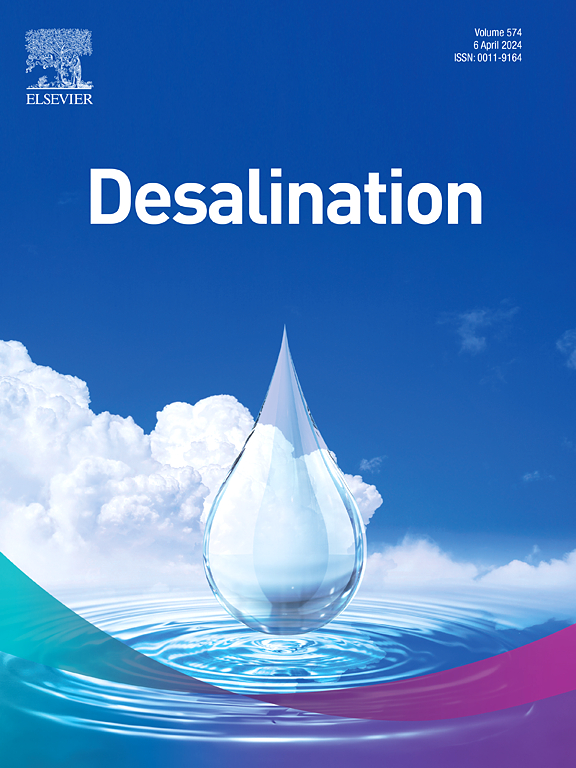Entropy-stabilized Prussian blue analogue electrode for selective lithium-ion recovery via capacitive deionization
IF 9.8
1区 工程技术
Q1 ENGINEERING, CHEMICAL
引用次数: 0
Abstract
We developed a capacitive deionization system for selective lithium-ion recovery that employs a high-entropy Prussian blue analogue (PBA) containing five different transition-metal ions. The random distribution of these metal ions increases the system's configurational entropy, which helps disperse redox strain and mitigate lattice distortion during lithium-ion insertion and extraction. Additionally, the vacancy-rich channels facilitate lithium-ion transport, resulting in a stable and reversible intercalation process. The high-entropy PBA exhibited a high specific capacitance of 495 F g−1 and retained 90.7 % of its initial capacity after 100 charge–discharge cycles. In selective-ion recovery testing using a mixed-salt feed solution containing Li+ and Ni2+ ions, the system achieved a salt adsorption capacity of 54.8 mg g−1 and a Li+/Ni2+ selectivity coefficient of 21.9. These metrics surpass those of conventional PBAs, highlighting the potential of entropy-stabilized frameworks in obtaining practical and durable lithium-ion recovery systems.

通过电容去离子选择性锂离子回收的熵稳定普鲁士蓝模拟电极
我们开发了一种用于选择性锂离子回收的电容去离子系统,该系统采用含有五种不同过渡金属离子的高熵普鲁士蓝类似物(PBA)。这些金属离子的随机分布增加了系统的构型熵,有助于分散氧化还原应变,减轻锂离子插入和提取过程中的晶格畸变。此外,富含空位的通道有利于锂离子的输运,从而导致稳定可逆的嵌入过程。在100次充放电循环后,高熵PBA的比电容为495 F g−1,保持了90.7%的初始容量。在含有Li+和Ni2+离子的混合盐料溶液中进行了选择性离子回收试验,该体系的盐吸附容量为54.8 mg g - 1, Li+/Ni2+选择性系数为21.9。这些指标超过了传统的PBAs,突出了熵稳定框架在获得实用耐用的锂离子回收系统方面的潜力。
本文章由计算机程序翻译,如有差异,请以英文原文为准。
求助全文
约1分钟内获得全文
求助全文
来源期刊

Desalination
工程技术-工程:化工
CiteScore
14.60
自引率
20.20%
发文量
619
审稿时长
41 days
期刊介绍:
Desalination is a scholarly journal that focuses on the field of desalination materials, processes, and associated technologies. It encompasses a wide range of disciplines and aims to publish exceptional papers in this area.
The journal invites submissions that explicitly revolve around water desalting and its applications to various sources such as seawater, groundwater, and wastewater. It particularly encourages research on diverse desalination methods including thermal, membrane, sorption, and hybrid processes.
By providing a platform for innovative studies, Desalination aims to advance the understanding and development of desalination technologies, promoting sustainable solutions for water scarcity challenges.
 求助内容:
求助内容: 应助结果提醒方式:
应助结果提醒方式:


